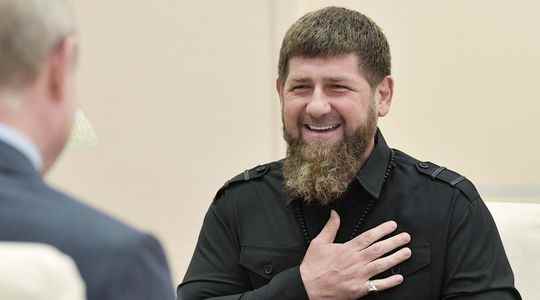Often bearded, in black fatigues, arms in hand… Chechen soldiers do not go unnoticed. The “Kadyrovtsy” are currently deployed in the war in Ukraine by their leader, Ramzan Kadyrov, president of the Russian republic of Chechnya. On February 25, this Kremlin close friend released a video of a speech to his troops, in which he advised President Zelensky, who he said would soon no longer be, to call “Commander-in-Chief Vladimir Vladimirovich Putin and to apologize to him.” In response, several thousand soldiers shout “Allahu Akbar”.
The day after the launch of the Russian offensive in Ukraine, the Chechen army announced that it was coming to reinforce the ranks of its compatriots. Four days later, on March 1, these soldiers themselves broadcast the images of their entry into Ukrainian territory, in particular in the region near Chernobyl, north of Kiev. While it is still difficult to identify their precise role in the conflict, their participation in the fighting is beyond doubt. Kadyrov himself announced, on the same day, the death of two of his men.
“They are there to scare”
“It is too early to say what military role they will have in this war, but their strong psychological impact is undeniable, analyzes journalist Wassim Nasr, author of Islamic State, the fait accompli (Plon, 2016). These soldiers will not have the scruples that a Slav can have towards another Slav, that is, a Russian towards a Ukrainian.” The effect sought is to frighten the population. “They are trained and are there to scare, abounds Anne Le Huérou, lecturer at the University of Paris Nanterre and specialist in Russia. Their presence adds a layer to demoralize the enemy and serves a psychological function in this war.”
The mobilization of Chechen fighters in Ukraine is part of the terror propaganda orchestrated by Moscow. These men, who form a contingent of around 20,000 soldiers, have “a particularly bloodthirsty reputation”, points out Thorniké Gordadzé, researcher at the International Institute of Strategic Studies and former Georgian minister in charge of relations with the European Union.
Total impunity
These soldiers, and the video showing their dedication, also serve as internal propaganda in Russia, underlines Anne Le Huérou, in order to “show Kadyrov’s loyalty to Vladimir Putin”. The Chechen leader took control of his autonomous republic in 2005, a year after the death of his father president, killed in a car accident. Putin appointed him directly Prime Minister, then President two years later. Kadyrov’s relationship with the head of the Kremlin allows his army to have carte blanche in Chechnya and beyond its borders: its military police hunts homosexuals on its territory, tortures them and tracks down opponents as far away as Europe for eliminate.
Kadyrov’s name is also associated with several murders in Russia, including that of opponent Boris Nemtsov, killed near the Kremlin in 2015. “But Putin protected Kadyrov, who is a very important ally”, underlines Thorniké Gordadze.
According to the former Georgian minister, “if Chechnya is under the jurisdiction of Russia, it is because Kadyrov wants it to be”, and “this beast fed by Moscow should not turn against its master”. Its army can however represent a danger for Russia, “because it could get out of control”, continues Thorniké Gordadzé. And to add: “It is only thanks to the existence of this pro-Russian group that Moscow has succeeded in keeping Chechnya under its yoke, at the cost of Kadyrov’s total impunity which terrorizes everyone, even beyond of Chechnya.”
Playing above all an internal police role in Chechnya, the Kadyrovtsy are also deployed abroad, in support of the Russian army. “In 2008, Kadyrov was among the first to arrive in Georgia [NDLR : pendant l’invasion russe]with other militias and warlords”, recalls Thorniké Gordadzé. In 2014, we find them in the separatist regions of Donbass, in Ukraine, where they fight alongside pro-Russian separatists. “These are shock troops who must to be there whenever Russia needs it”, summarizes the former Georgian minister.
In Syria, Kadyrov’s soldiers constituted a separate contingent of the Russian army and had the mission of making the link with the Sunni Muslim population. “They are integrated into the Russian forces, with battalion numbers, so ultimately Russia is responsible for their actions,” explains Anne Le Huérou. While she denies any authority over the mercenaries of the private Wagner group.
A radical Islam enemy of the jihadists
Kadyrov can also be described as a radical Islamist. In January 2015, the government had, for example, organized demonstrations against Charlie Hebdo, after the attacks that had targeted the editorial staff. And laws, in accordance with Sharia, prohibit homosexuality and the sale of strong alcohol.
“Vladimir Putin is not interested in Kadyrov’s ideology and his radical Islam. All that matters is his loyalty,” says Thorniké Gordadze. “It’s also a way to keep these soldiers on the Russian side to fight against jihadist groups active in the Caucasus and possibly so that some of them are not tempted to join jihadist groups”, analyzes Wassim Nasr. And to specify that if the Kadyrovtsy practice a rigorous Islam, they do not respond to jihad and are “considered as apostates by jihadist groups like al-Qaeda or the Islamic State, because they are fighting for an orthodox man and army “.
